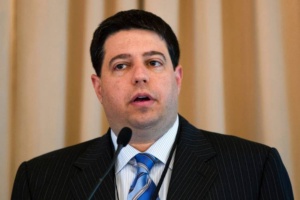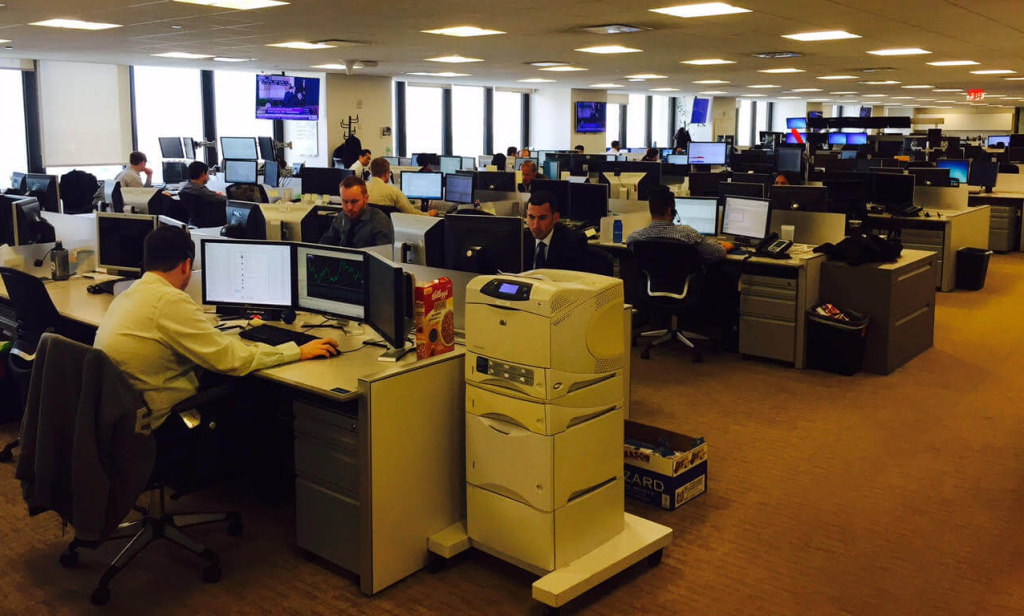A candid and open one to one with FXCM’s CEO Drew Niv on what it was like on January 15
January 15, 2015. Black Thursday. The Swiss National Bank suddenly sent unprecedented volatility into the markets. Here is what it looked like from the office of FXCM CEO Drew Niv, one of the world’s most astute industry leaders

Composure, experience and the ability to steer the largest publicly listed FX company in the world through an extremely difficult, unexpected and sudden change in circumstances whilst maintaining an even corporate keel are attributes that only very few of the human condition would perhaps manage.
For Drew Niv, CEO of FXCM Inc (NYSE:FXCM) however, this reality hit home on Thursday, January 15 2015. The all-encompassing and dramatic wave of volatility as the Swiss National Bank removed the peg on the Swiss Franc vs the Euro caused many companies to be exposed to negative client balances, and indeed some of those companies were unable to continue their operations at all.
FXCM, just 15 months on, remains a bastion of stability, almost completely intact, and looks forward to as strong a future as it did prior to the event which caused so much commercial devastation to many firms.
In the aftermath of what has now become known as ‘Black Thursday’, industry executives, traders, news reporters from the mainstream press and those with an interest in electronically traded financial instruments followed FXCM’s fate closely. The company was exposed to almost $300 million in negative client balances, and due to its standing as one of America’s giants, was immediately subject to a potential end of the road by shareholders, regulatory authorities and indeed is own financial position.
Today, here at FXCM’s global headquarters in New York City, FinanceFeeds met with Drew Niv, who spoke candidly about how he so effortlessly steered the company through this extreme event with such aplomb that the company remains as it was in terms of volumes, client base, staff and commercial strength.
What was it like on the actual day?
Mr. Niv explained that “As soon as it became apparent that these about 3,000 clients had suffered such significant loses, we notified our regulators and the regulatory authorities arrived at the office.”
“We have been doing this for 16 years now, so we have been through a lot of turmoil, and have a lot of crucial experience.”
“If you look at FXCM today, it is effectively the same company as prior to January 15 2015. Most of our customers stayed, almost all of the staff stayed. We did sell some non-core assets and for a few months we had some losses, however we kept the market share in tact. What many people don’t realize is that we effectively plugged the capital shortfall with Leucadia’s loan.”
In terms of actual impact on the business as a result of attrition, Mr. Niv explained “The customers that we lost were mainly some of the large customers. The total number of our clients that were actually affected by the market volatility that followed the SNB’s decision approximately 3,000 customers which comprised of around 200 here in the United States, and the rest were overseas.
This is a small amount, especially when bearing in mind that some were inactive customers. There were also some customers which stayed with FXCM but deposited less funds because, for example, they were happy to continue trading but would prefer to hold $50,000 in the company rather than $1 million.”

The principals who founded the company still own a big stake in the company so the big loss was effectively mine.
“If I looked at life as what I had on Friday and notice that I had less the following Monday, I would commit suicide every day. I have to look back at what I had 20 years ago which was absolutely nothing, and what I have today, which is still a lot. My kids still love me, and I have five of them. My wife didn’t leave! I personally lost approximately $200 million, however it is not healthy to show a lot of emotion, especially when you are in business.” – Drew Niv, CEO, FXCM
FXCM had 12 hours at first, not a weekend like other firms which have experienced something like this.
From his office which overlooks downtown Manhattan from the 50th floor, Mr. Niv calmly explained “We weren’t given a lot of time from the regulators. We had to act very quickly in the best interests of the customers, employees and shareholders. Although the outcome was actually very positive, had it not been, the absolute worst case is that we would have ceased. Other senior executives within the company explained to FinanceFeeds that Mr. Niv kept completely calm throughout the event.
“I said to myself, this loss I can personally take. In 5 years I will recover it and it will still be more than most people will have anyway. Philosophically I believed at the time that a person or any business that is in financial trouble will always make the wrong decisions as they will be driven by pressure and other factors, so therefore we always make sure that we are not in that position at any time and that we can make decisions that are sensible, regardless of the circumstances” – Drew Niv, CEO, FXCM
The composure with which this was handled is remarkable and in the opinion of FinanceFeeds, very unusual. It is well known that many executives would tend toward ‘meltdown’ in such a circumstance and either close down, or start holding emergency meetings and creating insecurity in the minds of staff by implementing emergency procedures. Mr. Niv did not go down that road at all. Despite the media speculation and rumors that the company had nervous employees and shareholders, the opposite is true, as is quite clearly depicted by the company’s situation today.
“If i had taken it out on the workforce it would have finished the company” said Mr. Niv. “They would have started leaving, the news would have picked up on it, and the shareholders would have become nervous. This is absolutely not the right way to handle any situation if a company is to be preserved in good condition” he said.
What has been learned by the industry? The wrong lesson!
A question that is asked to many senior executives in the FX industry following the Swiss National Bank’s decision and the black swan event that it created remains centered around what has been learned and if the industry has learned a risk management lesson.
Mr. Niv considers the outcome to have been somewhat the wrong lesson. “The Swiss National Bank event has helped the industry take more risk management, which is a good thing” said Mr. Niv. “but instead, the wrong lesson was learned. Many unregulated B-book companies in obscure jurisdictions actually made a lot of money from this and that is the first problem. The second is that we were already facing a massive credit crunch, and banks are cutting off all access. The black swan event accelerated this and targeted the retail FX sector, and banks cut credit to a lot of people.
“There is a customer base of very large clients which are retail brokers because they have nowhere else to go. This did however open up the opportunity we recently took in offering a prime of prime solution for this crowd.”
Debt to Leucadia
Nobody likes to talk about the money they owe to a creditor, however Mr. Niv’s open and concise explanation goes hand in hand with his remarkable acumen. He summarized the current position in that “$117 million has already been paid, and the entire balance will be completely paid.”
The original terms
“If you were going to lend someone $300 million, how much due diligence would you do on them? Probably months, using auditors and lawyers, and even then, you would be careful. Leucadia had one day to decide, and they had to trust us. I gave my word that I would stay and give them their money back. They had to take my word for it and as a result were safeguarding themselves, which I consider to be absolutely normal business practice” said Mr. Niv.
The emphasis here must be on the terms being applied due to the short time, and not due to any predatory mindset from Leucadia. “We did this deal on the strength of history and on who we are. They did it on a whim that they are backing the market leader” stated Mr. Niv.
Mr. Niv stated that the company’s market capitalization is smaller because of the reverse share agreement. Apart from that everything is the same. “If you make massive changes, it will make customers leave” said Mr. Niv.
“Looking at the next few years, we will stay within our retail FX roots with a much smaller and different looking institutional business,” he explained. FXCM Pro will service retail brokers, small hedge funds, largely algos and HFTs through prime of prime using core technology, as well as our whole sale business.
Photographs from top: FXCM CEO Drew Niv. A hive of activity at FXCM’s customer support nerve center; View from FXCM’s Head Office in downtown Manhattan; Andrew Saks-McLeod and Noam Stiekema at FXCM; FXCM’s stylish Manhattan premises; View from FXCM’s Manhattan headquarters. All photographs copyright FinanceFeeds












